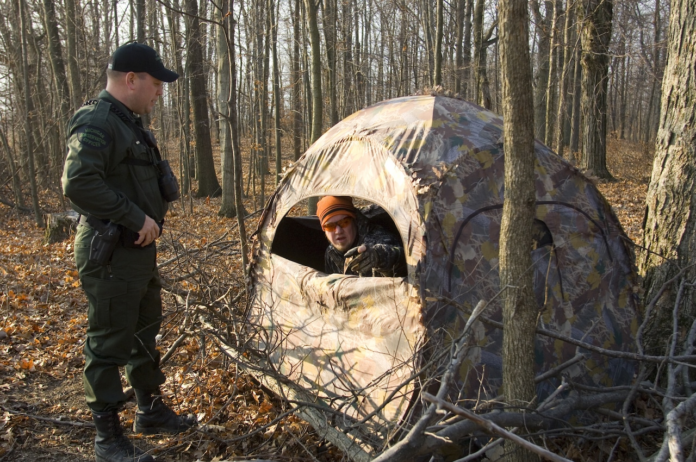LANSING, MI — House Republicans advanced legislation that would force Michigan conservation officers and pollution inspectors to obtain a search warrant or consent before entering private property.
On Wednesday, Sept. 24, the House natural resources committee advanced two bills, HBs 4421 and 4073, which together would curtail an exemption under the U.S. Fourth Amendment which treats land outside a home’s immediate area as open to warrantless entry.
The restriction would apply to the Michigan departments of Natural Resources (DNR) and Environment, Great Lakes and Energy (EGLE).
The legislation would need to surmount the Democratic-controlled Senate and governor’s office before it could become law, an unlikely prospect. The bills did not receive any support from minority Democrats on the House committee and have no bipartisan support.
Were they to become law, Michigan would join several states which have rejected or are litigating the “open fields” doctrine, a federal rule that allows law enforcement to enter and look around pastures, woods, vacant lots and other privately-owned areas outside the “curtilage,” or immediate area around a home or dwelling.
Since the 1980s, state courts in Montana, New York, Oregon, Vermont, Washington, Mississippi and Tennessee have rejected the doctrine under state constitutions. The open fields doctrine is the subject of pending litigation in Virgina and Pennsylvania.
Michigan Republicans say the bills are needed to strengthen private property rights while opponents argue they would unnecessarily handcuff officers, delay investigations and hamper law enforcement on the vast majority of wildlife habitat.
During a hearing last week on Sept. 17, Rep. Dave Martin, a Republican from Genesee County who chairs the House natural resources committee, said his party is attempting to rein-in bureaucratic “overreach” at the DNR, which Republicans have targeted this year with escalating rhetoric, hearings and budget cuts based on policy differences.
Neither the DNR nor EGLE testified at the hearing.
Martin framed the open fields doctrine as a misused relic of colonial times and Prohibition-era liquor hunts that’s out-of-step with the age of airborne surveillance and satellite positioning apps.
“If you have 40 acres and you have a pond and want to go skinny dipping, you should have the expectation of privacy — that you can do that on your own private property,” Martin said. “Private property is a big thing. It’s a founding principle. Our country is founded on it.”
“They can leave cameras on your property. You wouldn’t know it,” Martin said. “Now, that’s craziness in my book.”
The bills would not stop all warrantless private property entry. They make exceptions for an officer in “hot pursuit” of a criminal suspect or who reasonably believes a delay would result in destruction or concealment evidence or that a person would be endangered.
They also include a carve-out which would allow DNR officers with probable cause to enter non-dwelling or curtilage areas when investigating alleged hunting and fishing violations.
Martin and bill sponsor Rep. Tom Kunse, a Republican from Clare, sparred with Democrats worried about practical impacts on conservation and pollution investigations.
Rep. Regina Weiss, a Democrat from Detroit, worried that there could be different understandings of what might be considered an imminent enough threat that would justify state pollution responders crossing private property without a warrant.
“There’s a balance here and I’m concerned that we might be erring because of some more isolated incidents and not giving enough attention to the public stewardship and the public safety component of this,” said Rep. Tonya Myers-Phillips, a Democrat from Detroit.
“It does take time to get a warrant and in some areas that might take longer time than others, right? You know, when you’re trying to get a hold of a district court judge and who knows what their case load is like and what their hours are like?” she continued.
Myers-Phillips questioned whether there was enough harm to justify the change. Martin alleged he’s heard “lots of complaints” and Kunse said some people are too scared to testify. Martin cited anecdotal stories about EGLE staff entering farms “because they think something’s wrong going on without ever contacting the landowner.”
Rep. Dave Prestin, a Republican from Cedar River in the Upper Peninsula who is sponsoring one of the bills, said he’s had former lawmakers who “are also terrified to speak in public.”
He alleged that DNR officers have targeted people with intimidation tactics. “They’ve had their blind knocked on opening morning of deer season to check whether or not they have their licenses and whether or not their weapon was loaded. One of them told me their check was whether or not their weapon was loaded before daybreak,” Prestin said.
“This is a major friction point between private property owners and the DNR,” said Prestin, who alleged without providing evidence that there have been instances when “where the temperature has risen to the point where I do believe there was an injury and or a death.”
The committee heard testimony from former officers with the Michigan Resource Stewards, a nonprofit which opposes the legislation.
Retired conservation office Gregory Eagle of Midland said the open fields doctrine is necessary and “regularly applied for criminal searches, discerning illegal drug activities, searches for lost children and lost aged adults, wildfire detection amongst many others.”
“Assertions that this over 100-year document is outdated and unused by most law enforcement is an untruth,” Eagle said.




